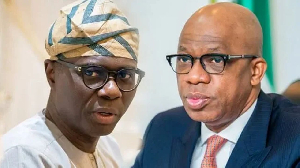A filmmaker, Editi Effiong, tells BLESSING ENENAITE about his career and other issues
What inspired you to produce the film, ‘The Black Book’?
The Black Book is like a love letter to my country.
The movie is said to be the first Nigerian movie to top the Netflix world ranking, having made it to number four within two days of its release. How did that make you feel?
I want to say thank you to Nollywood for giving us (my team and I) this chance. We knew our movie was great, but we never thought it would do this well. I’m thankful for the people who worked with me on this project – the actors, the team, and the people who invested in it. They made it all possible. This success is not just for Nollywood, but for all the people who started this amazing film industry, and for everyone in Africa. It proves that our industry is growing, and I’m really happy to be a part of it.
The Black Book is your first shot as a director. What were the challenges you faced in your role and how were you able to overcome them?
Every day on the movie set was hard, but when I saw how committed my team was to making this film, it really inspired me. On the first day of filming, I admitted that I might not have as much experience as some of them, but I asked them to trust me and follow my lead, believing that together we could create something extraordinary with the movie.
We also had to deal with the challenges of COVID-19 because we were filming in early 2021. We had to regularly test our crew for the virus. Unfortunately, there was an outbreak on set, which cost us 20 per cent of our budget. This meant that we couldn’t shoot for 12 days and contracts were affected during this time. We also had to test all the background actors, who would be close to our main cast. It was definitely a tough situation, but I’m thankful that we were able to overcome it.
You are the founder of Anakle Films. Can you state some of your other works as a filmmaker?
I made a short film called ‘Fishbone’, which can be watched on YouTube. I also directed some pickup scenes for my first film, ‘Up North,’ which I produced. It was like going to school for me because I’m still learning. ‘The Black Book’ is my first feature-length film as a director. Before diving into filmmaking, I had a background in advertising and technology. I led advertising campaigns for brands like Wikipedia, Access Bank, Sterling Bank, Globacom and many more in Nigeria and sub-Saharan Africa.
It has been said that Nollywood needs to improve on the quality of its stories and you did that with ‘The Black Book’. However, the film is said to have been set in 2020, 1990s and 1980s but the camera quality showed epic or 1990s setup in all the scenes. Was there a specific reason for that?
I disagree with that observation. The cinematography of the film is one of the big pluses, almost unimpeachable if you ask me. We shot with world-class equipment and it shows in the final product. However, every film has a visual language and for us, this meant a reinforcement of our commitment to simplicity and authenticity.
Related News
RMD, Shaffy Bello, others hailed for 'The Black Book' performance
Lagos is often depicted as this glossy, urbane city, but the Lagos we wanted to see is gritty. Lagos Island, for example, is almost frozen in time, and we showed it as that without embellishment. Tarkwa Bay, where Paul (Richard Mofe-Damijo’s character in the movie) lives, looks exactly the way we showed it in the film. We have to take a step away from the ‘glossy Lagos’ that is often depicted on TV and actually appreciate the true texture of the city. Of course, the hazy North in the Kaduna scenes is just what Kaduna is – hazy, textured and brown.
I guess you are looking forward to award nominations with this work. What other aspirations do you have or the impact do you want the work to make?
I didn’t come to make films for awards. My main goal is to share stories about Africa with Africans and the world. I’m happy that ‘The Black Book’ has been seen by millions of people around the world. ‘The Black Book’ is just the beginning of our five-year slate. We are making more investments to tell even more important stories.
Nigeria is said to be neck-deep in corruption and your movie espouses that. Do you think movies have a way of influencing the policies of those in power considering that movies that address the ills in government have been produced in the past but some of the leaders seem not to be bothered?
Art must reflect society, and if the cards are played right, art can influence society. Films are made to tell stories, whether they are made up or based on real events. If ‘The Black Book’ helps address problems in any society, whether it’s in Nigeria or somewhere else, I’m really thankful. Ultimately, it’s up to the viewers to decide if they care or not. I can’t make anyone change their mind, but it is important to make this statement – ‘silence is the enemy’. We must speak up for justice for everyone, whether we like them or not, but especially for people we do not like.
Aside from filmmaking, what are the other things you do?
I work in digital advertising and tech. What I spend most of my time on really depends on what the key priority of the day is for me. As of today, my priority is ‘The Black Book’. Tomorrow, it may be helping one of my financial services clients design a new fintech service.
Who are your biggest cheerleaders?
I am blessed with great friends and family who are very supportive. I don’t take that for granted at all. In the last few weeks, I have relied on my family and trusted friends to keep me grounded.
How do you unwind?
I spend time with my family, read, write, cook and try out new wines.
Entertainment of Sunday, 22 October 2023
Source: www.punchng.com













